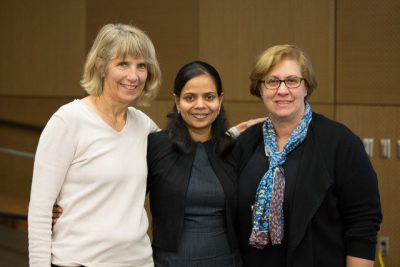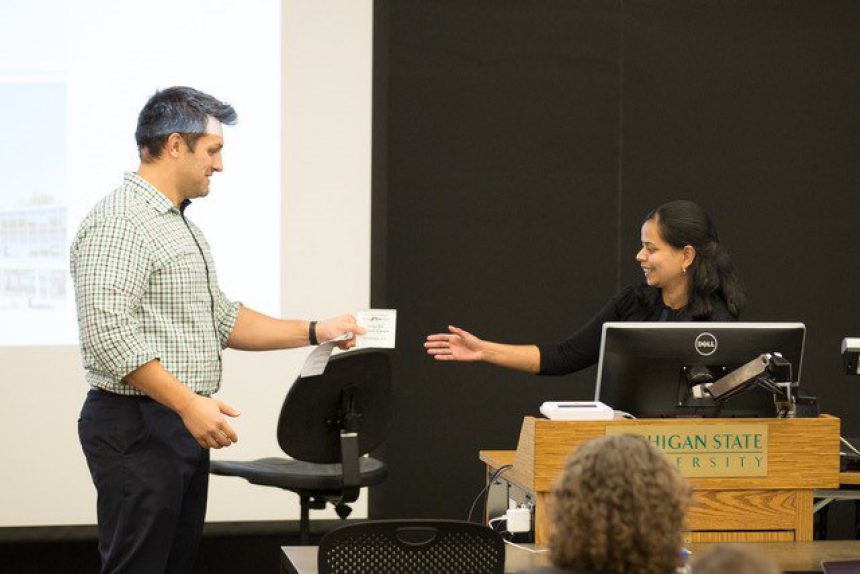Former trainees of Dr. Whittam, 2018 symposium speakers
- Dr. Teresa Bergholz, North Dakota State University
- Dr. Sivapriya Kailasan Vanaja, UConn Health
- Dr. David Lacher, Food and Drug Administration
- Dr. Shannon Manning, Michigan State University
- Dr. James Riordan, University of South Florida
- Dr. Seth Walk, Montana State University
- Dr. Ben Whittam, Indiana University School of Medicine
On November 2, members of the MSU College of Veterinary Medicine’s Comparative Medicine and Integrative Biology (CMIB) community gathered with their peers from the Department of Microbiology and Molecular Genetics and across the United States for the Thomas S. Whittam Memorial Symposium. Whittam, who bridged the Department of Microbiology and Molecular Genetics and the College of Veterinary Medicine, was a Hannah Distinguished Professor at Michigan State University and a renowned expert in bacterial evolution. Before passing in 2008, he served as a mentor to countless undergraduate and graduate students.
“Cultivating a productive and rewarding mentor/mentee relationship is critical in the development of the scientific and professional skills of young researchers. Dr. Whittam’s approach was one of constant encouragement and engagement, while holding everyone to the highest standards, and thus exemplified the best,” says Dr. Vilma Yuzbasiyan-Gurkan, associate dean of Research and Graduate Studies for the College of Veterinary Medicine. “While mentees have a responsibility to be active participants in this relationship, it falls upon the mentor to provide direction and enable the growth of the young scientist.”


Dr. Vincent Young, professor of Microbiology and Immunology at the University of Michigan, presented the Whittam Memorial Lecture. Former trainees of Whittam also presented short talks, which highlighted their current research and how Whittam impacted them. The presentations covered research regarding microbial evolution, ecology, pathogenesis, food safety, and epidemiology.
Among Whittam’s former trainees present was Dr. Sivapriya Kailasan Vanaja, assistant professor of Immunology at UConn Health. Kailasan Vanaja is a veterinarian and PhD graduate of the College’s CMIB Program.
“We are very proud of our graduate students; their career trajectories have been impressive,” says Yuzbasiyan-Gurkan. “The interdisciplinary perspective and challenging nature of the program, coupled with extraordinary mentors, has allowed them to pursue their intellectual passions and develop into independent investigators and leaders. Dr. Vanaja exemplifies this trajectory.”
The Thomas S. Whittam Memorial Symposium was sponsored by the Department of Microbiology and Molecular Genetics and the Whittam Memorial Lecture fund.

Q&A with Dr. Sivapriya Kailasan Vanaja, former Whittam trainee
Please tell us about your current work.
The primary focus of our research is to determine the mechanisms by which bacterial pathogens modulate host immune responses. The innate immune system monitors the extracellular and intracellular compartments for the presence of invading pathogens and other danger signals, and elicits appropriate defense reactions that are essential for the elimination of these agents. Studies in the past decade including ours have unraveled numerous bacterial factors that activate various arms of the innate immune system, such as the toll-like receptors (TLRs) and inflammasomes. Since innate immune responses play a crucial role in the clearance of infectious agents, it is natural that pathogens have developed strategies to inhibit the same. However, little is known about regulation of innate immune responses by bacterial pathogens. Our research aims to address this knowledge gap and focuses on identifying bacterial mechanisms that inhibit or modulate innate immune activation.
How has Dr. Whittam’s mentorship influenced you?
Tom had tremendous influence on my development as a scientist. When I joined his lab as a PhD student, I had minimal past research experience and was skeptical about my ability to be successful in academia. Tom’s constant encouragements gave me the confidence to consider myself as a scientist and start designing my own research projects. Tom gave me the independence to take my projects in the directions I wanted and never asked me to stick to the overall research theme of the lab. This was crucial, as it helped me transition smoothly into a postdoc position in a lab where you were expected to be completely independent, and later into a faculty position. Although he let me be independent, Tom was always there to help me whenever I struggled with difficulties in my projects. He made sure I had all the resources available and introduced me to experts in the field if I wanted answers for specific technical questions. Most importantly, Tom was highly invested in each of his trainee’s careers as a whole. Early in my PhD itself, he pointed out to me I had certain strengths to be successful in academia, such as the ability to write clearly, and helped me hone them. He also advised me to never make compromises in my career ambitions for personal/family reasons, which I consider significant advice as a woman in science. Overall, I consider myself fortunate to have had Tom as my PhD mentor.
What was your experience like in MSU’s Comparative Medicine and Integrative Biology (CMIB) Program?
CMIB was an excellent graduate program. The main strength of CMIB was that it was an interdisciplinary program and, therefore, many labs, ranging from those focusing on clinical/translational research to basic sciences, were part of the program. This provided us students with options to rotate in any of these labs and choose the exact field of study that matched our interests. The course and research expectations for graduate students were described clearly to us in the beginning of the program itself and the program chair, Dr. Vilma Yuzbasiyan-Gurkan, and the administrative staff were always there to help us in case of difficulties. CMIB retreats were an excellent opportunity to meet the faculty and other students in the program and network. Overall, the environment in the program was highly collegial and encouraging to the students.
What advice might you give to current students looking for a mentor?
I would advise students to definitely rotate in multiple labs to get an idea about the mentoring ideology of the PI and the daily work structure in the lab. Choose a mentor who i) constantly encourages you, appreciates you when you do good work, and helps you develop confidence; ii) trains you to be independent as a researcher; and iii) invests in your overall development as a scientist by letting you go to meetings, introducing you to experts in the field to develop your professional network, and helping you hone skills, such as scientific writing.
What advice would you give to current CMIB students about achieving success in pursuing an academic career?
Your success/productivity as a postdoctoral fellow is probably the most important factor that determines your successful transition into an academic career. Therefore, I would advise the students to pay attention to the following when they choose a postdoctoral lab:
- History of the lab: check how many of the past trainees have successfully transitioned into faculty positions in academia.
- Productivity of the lab: make sure the lab consistently publishes papers in leading journals in your specific field.
- Funding status of current trainees: check if the postdoctoral fellows in the lab have their own funding or fellowships. Your history of funding is an important criterion evaluated by faculty search committees and, therefore, it is crucial that your postdoctoral lab allows you to avail independent funding for your research.
Importantly, to get a postdoctoral position in one of the labs with the above characteristics, you need to have a strong CV at the end of your PhD. So, work hard, publish quality papers, and go to meetings and talk to productive PIs in your field so that they will remember your name when you apply. Once you start the postdoc, keep working hard, develop projects independently, publish high-quality papers, and try to carve a niche for yourself in the field.
